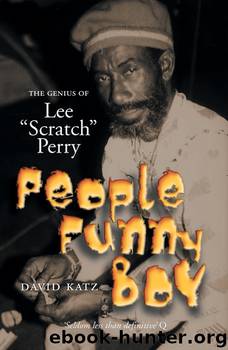People Funny Boy by David Katz

Author:David Katz [Katz, David]
Language: eng
Format: epub
ISBN: 978-0-85712-034-2
Publisher: Music Sales Corp.
Published: 2006-03-01T16:00:00+00:00
Though Perry felt the original lyrics needed slight amendments, he began to lay the rhythm straight away. As Murvin recalls, “He said he needed likkle more words, so we went and put in couple more words and Boris Gardiner lay the rhythm along with Ernest Ranglin and Sly Dunbar, Keith Sterling on keyboards and Joe Cooper, an old friend from Port Antonio; he was a very good organist who usually play with the Mighty Vikings.”
In addition to the firm musicianship, harmony vocals by Barry Llewellyn and Earl Morgan again gave the song a particular texture, their wordless chorus helping ensure its success. But it was the song’s perceptive lyrics that made it stand out overall, its imagistic commentary on society’s symbiotic parasites striking a note with listeners far and wide.
Everyone present at the Black Ark knew ‘Police And Thieves’ would hit, so Perry arranged for the single to be handled by Federal, who issued the song on their Wildflower subsidiary. Backed by the appropriately named ‘Grumbling Dub,’ which reduced the vocal to stabs of echoed murmuring, the single was an immediately strong seller in Jamaica.
Chris Blackwell recalls being struck by the topical nature of ‘Police And Thieves,’ having first heard the song after passing through a roadblock. “I remember going down to his studio one time and we just got stopped for no reason on the way, have an M16 shoved in our face by a young police guy. When I went in the studio, they were doing ‘Police And Thieves.’”
Island Records issued the single in the UK in July, where it received widespread airplay and surprising critical accolades in the normally sarcastic music press; the song was also a hit in the USA, where it helped reggae to make major inroads in disparate parts of the nation, particularly in the more liberal coastal cities.
Part of the song’s success in the UK was linked to the Carnival, the annual celebration of the Caribbean presence in Britain held at the end of August in the west London districts of Notting Hill and Ladbroke Grove. The Carnival was born in the late Fifties largely as a reaction to the tensions that arose between black immigrants and their reluctant white hosts, many of whom sought to exclude black people from British society. It became a site of resistance and rebellion through its open display of traditions upheld by those of African descent in the Caribbean, contributing to an emerging hybrid culture through a dynamic transformation of the Dickensian drabness of London’s streets, but it would remain a source of conflict between an increasingly vocal black population and the hostile and repressive authorities that upheld specifically racist social policies; police and local politicians would repeatedly attempt to stop the Carnival once it began attracting large numbers.
The Notting Hill Carnival changed dramatically in the mid Seventies. During the late Sixties, Carnival was geared largely towards the Trinidadian immigrant community; calypso acts and steel bands were the exclusive musical feature of the festival and its procession was modelled after the annual Easter Carnival in Port of Spain.
Download
This site does not store any files on its server. We only index and link to content provided by other sites. Please contact the content providers to delete copyright contents if any and email us, we'll remove relevant links or contents immediately.
| Actors & Entertainers | Artists, Architects & Photographers |
| Authors | Composers & Musicians |
| Dancers | Movie Directors |
| Television Performers | Theatre |
Cecilia; Or, Memoirs of an Heiress — Volume 2 by Fanny Burney(31928)
Cecilia; Or, Memoirs of an Heiress — Volume 3 by Fanny Burney(31914)
Fanny Burney by Claire Harman(26581)
We're Going to Need More Wine by Gabrielle Union(19020)
Plagued by Fire by Paul Hendrickson(17391)
All the Missing Girls by Megan Miranda(15884)
Cat's cradle by Kurt Vonnegut(15293)
Bombshells: Glamour Girls of a Lifetime by Sullivan Steve(14037)
For the Love of Europe by Rick Steves(13795)
Leonardo da Vinci by Walter Isaacson(13287)
4 3 2 1: A Novel by Paul Auster(12352)
The remains of the day by Kazuo Ishiguro(8944)
Adultolescence by Gabbie Hanna(8900)
Note to Self by Connor Franta(7655)
Diary of a Player by Brad Paisley(7537)
Giovanni's Room by James Baldwin(7297)
What Does This Button Do? by Bruce Dickinson(6185)
Ego Is the Enemy by Ryan Holiday(5389)
Born a Crime by Trevor Noah(5353)
